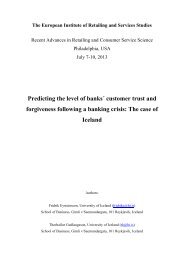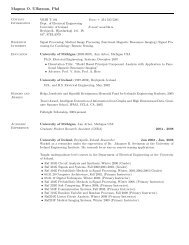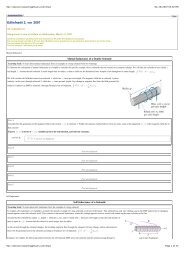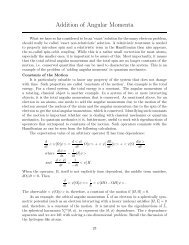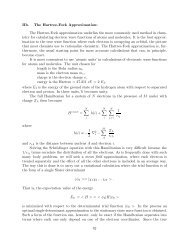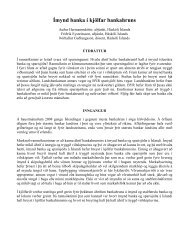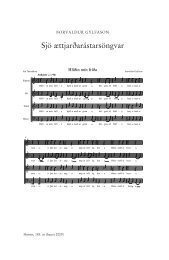summary of moody's jda for banks - Bad Request
summary of moody's jda for banks - Bad Request
summary of moody's jda for banks - Bad Request
You also want an ePaper? Increase the reach of your titles
YUMPU automatically turns print PDFs into web optimized ePapers that Google loves.
Global Credit Research<br />
Financial Institutions<br />
May 29, 2007<br />
Going <strong>for</strong>ward, there will be no<br />
significant impact on secondary<br />
market spreads …<br />
… nor on primary market<br />
activity<br />
It has not become much easier<br />
to <strong>for</strong>ecast Moody's ratings<br />
JDA application to other<br />
industries would take at least<br />
one year<br />
Sector Report - Summary <strong>of</strong> Moody's JDA For Banks<br />
FAQ<br />
What is the implication <strong>for</strong> secondary market spreads?<br />
Following increased volatility after the big bang on February 23 (and even<br />
be<strong>for</strong>e that date), the situation has calmed when Moody's announced to revise its<br />
approach in mid-March. Going <strong>for</strong>ward, the market will not adjust to spreads<br />
completely reflecting the new ratings <strong>for</strong> two reasons: First, there have always<br />
been spread differences between similarly rated <strong>banks</strong>, as the agencies' view is<br />
not 100% shared by the market. In the current case, the new ratings derive from<br />
a new methodology, and not from changed fundamentals, and are also based on<br />
an old story (too big to fail). Second, there are other rating agencies whose view<br />
is different, and which are also recognized by market participants. In this<br />
respect, we are interested to see the effects on Moody's Market Implied Ratings,<br />
which were introduced to shed some light on the differences between rating<br />
implied and actual spreads. Moreover, there are three other implications: (i) the<br />
number <strong>of</strong> split ratings increased, as has uncertainty about fair pricing; (ii) some<br />
small <strong>banks</strong>, as already happened, could terminate contracts with other rating<br />
agencies in order to improve their rating pr<strong>of</strong>ile and save costs and time at the<br />
same time; (iii) new investor groups have been allowed to invest, as certain<br />
rating hurdles (which impose investment limitations) have been cleared.<br />
Is there an impact on primary market activity?<br />
Moody's new ratings coincided with the market correction at the end <strong>of</strong><br />
February, abruptly stopping issuance activity, caused by both market<br />
uncertainty and hope <strong>for</strong> better finance conditions (induced by better ratings).<br />
Going <strong>for</strong>ward, however, we do not expect any further impact.<br />
Has it become easier to <strong>for</strong>ecast Moody's ratings?<br />
Not really. Although Moody's provides much insight into its scorecard weights<br />
<strong>for</strong> qualitative and quantitative criteria, there are numerous decisions whose<br />
individual result can only be <strong>for</strong>ecast in a certain range. However, their effect on<br />
the notching scale heavily depends on the actual outcome (which to a large part<br />
depends on the rating committee's decision), and in combination could lead to a<br />
completely different picture when compared to the alternative outcome.<br />
Will JDA be applied <strong>for</strong> other industries?<br />
Limited Basel II implications What about Basel II?<br />
We think that the discussion<br />
about Moody's credibility will<br />
soon come to an end<br />
While not having concrete plans, Moody's can imagine to apply JDA to other<br />
sectors, such as insurance or industrials. However, it would first publish<br />
proposals with request <strong>for</strong> comments by market participants.<br />
In the standardized approach, <strong>banks</strong> have to consider the second best rating if<br />
there are two or three ratings. In the advanced approaches, the bank has to<br />
make its own assessment anyway; the better Moody's rating could serve as an<br />
argument only when discussing the internal ratings with the auditor and<br />
regulator. Hence, a strong impact is limited to the standardized approach when<br />
there is only a Moody's rating.<br />
Has Moody's lost its credibility?<br />
Although there has been much criticism (both justified and unjustified, in our<br />
view), we dare the <strong>for</strong>ecast that the credibility issue will cease to exist in a few<br />
months time, following Moody's adjustment <strong>of</strong> its methodology.<br />
Bayerische Hypo- und Vereinsbank AG, CA IB International Markets AG, Bayerische Hypo- und Vereinsbank AG Milan Branch See last pages <strong>for</strong> disclaimer.<br />
8




